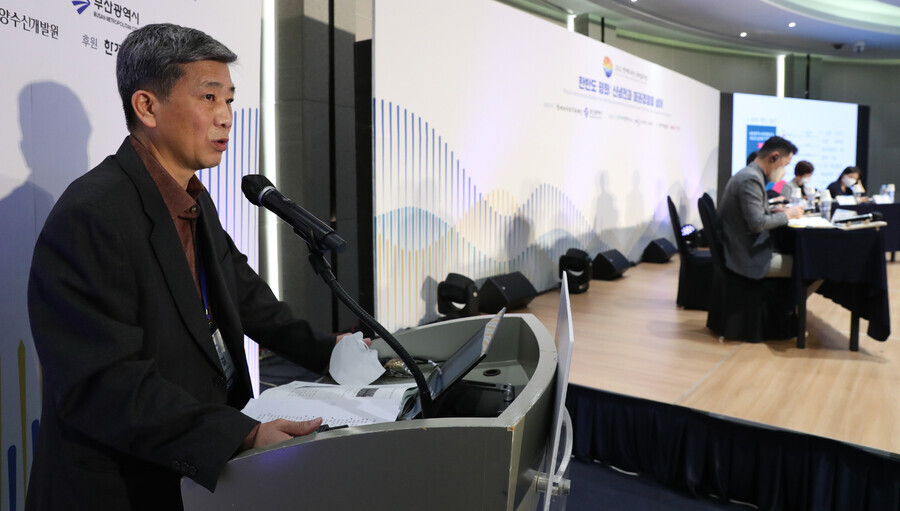hankyoreh
Links to other country sites 다른 나라 사이트 링크
Coexistence with nuclear-armed N. Korea increasingly certain, argue experts

A prognosis for the future of the Korean Peninsula, which is approaching the 70th anniversary of the Armistice Agreement in 2023, was the topic of the third session of the 2022 Hankyoreh-Busan International Symposium.
The symposium got underway at the Nurimaru APEC House in Busan on Wednesday.
Participants in a forum moderated by Park Sun-song, a professor at Dongguk University, observed that North Korea’s denuclearization is probably not feasible in the short term and agreed that steps should be taken to manage the status quo for now through dialogue and negotiations.
Kim Sung-kurl, director of the Hankyoreh Foundation for Reunification and Culture, delivered the first presentation, which was about the arms race on the Korean Peninsula and the threat it presents. “For North Korea, nuclear weapons are the regime’s destiny, both a means of preserving power and the center of its national defense. In this situation, North Korea cannot take steps to denuclearize in exchange for economic aid,” he said.
“Given the relationship with China and Russia, tackling the issue of denuclearization is like solving a high-level formula with many variables. In a certain sense, achieving denuclearization is an impractical ideal,” Kim argued.
Kim said that recent calls from the ruling party for South Korea to develop its own nuclear weapons are “not realistic because that would mean abandoning our alliance with the US. We have no choice but to rely on the US nuclear umbrella.”
While Pyongyang’s disarmament is a desirable goal, it’s not realistically achievable in the short term, asserted Ankit Panda, a senior fellow in the nuclear policy program at the Carnegie Endowment for International Peace, who spoke on the topic of how to coexist with a nuclear-armed North Korea.
According to Panda, the South Korea-US alliance needs to adapt to a nuclear-armed adversary. In addition to deterring North Korea, as the allies have done for decades, they also need to focus on managing risks and providing security guarantees for the North Korean regime, he said.
Panda stressed that coexistence with a nuclear-armed North Korea could be stabilized if South Korea were to deemphasize preemptive strikes and “decapitation” operations against the North Korean leadership. He also advised the US to avoid hinting at an intention to interfere in North Korea’s nuclear command and control system in a crisis situation.
“The world needs to acknowledge that North Korea is a nuclear weapon state and start working to reduce the resulting danger to the world,” underlined Kim Mi-kyoung, a sociologist who took part in the forum.
“The problem is that South Korea and the US are still clinging to past approaches even though things today are completely different from the past. We’ve chosen ‘peace through strength,’ which is easier — and more expensive — than the difficult process of building a sustainable peace, and we still seem to be choosing that approach today,” observed Shin Mee-jee, a manager at People's Solidarity for Participatory Democracy.
“The balance of terror does not actually serve genuine peace on the Korean Peninsula. Rather than matching strength against strength, we need a consistent approach for managing and ultimately changing the status quo through dialogue and negotiations,” said Han Ki-ho, a research professor at the Ajou Institute of Unification.
By Kim Hae-jeong, staff reporter
Please direct questions or comments to [english@hani.co.kr]

Editorial・opinion
![[Editorial] Penalties for airing allegations against Korea’s first lady endanger free press [Editorial] Penalties for airing allegations against Korea’s first lady endanger free press](https://flexible.img.hani.co.kr/flexible/normal/500/300/imgdb/original/2024/0502/1817146398095106.jpg) [Editorial] Penalties for airing allegations against Korea’s first lady endanger free press
[Editorial] Penalties for airing allegations against Korea’s first lady endanger free press![[Editorial] Yoon must halt procurement of SM-3 interceptor missiles [Editorial] Yoon must halt procurement of SM-3 interceptor missiles](https://flexible.img.hani.co.kr/flexible/normal/500/300/imgdb/child/2024/0501/17145495551605_1717145495195344.jpg) [Editorial] Yoon must halt procurement of SM-3 interceptor missiles
[Editorial] Yoon must halt procurement of SM-3 interceptor missiles- [Guest essay] Maybe Korea’s rapid population decline is an opportunity, not a crisis
- [Column] Can Yoon steer diplomacy with Russia, China back on track?
- [Column] Season 2 of special prosecutor probe may be coming to Korea soon
- [Column] Park Geun-hye déjà vu in Yoon Suk-yeol
- [Editorial] New weight of N. Korea’s nuclear threats makes dialogue all the more urgent
- [Guest essay] The real reason Korea’s new right wants to dub Rhee a founding father
- [Column] ‘Choson’: Is it time we start referring to N. Korea in its own terms?
- [Editorial] Japan’s rewriting of history with Korea has gone too far
Most viewed articles
- 160% of young Koreans see no need to have kids after marriage
- 2Months and months of overdue wages are pushing migrant workers in Korea into debt
- 3Presidential office warns of veto in response to opposition passing special counsel probe act
- 4[Editorial] Penalties for airing allegations against Korea’s first lady endanger free press
- 5Historic court ruling recognizes Korean state culpability for massacre in Vietnam
- 6Hybe-Ador dispute shines light on pervasive issues behind K-pop’s tidy facade
- 7Japan says it’s not pressuring Naver to sell Line, but Korean insiders say otherwise
- 8[Guest essay] How Korea must answer for its crimes in Vietnam
- 9Story of massacre victim’s court victory could open minds of Vietnamese to Korea, says documentarian
- 10Historic verdict on Korean culpability for Vietnam War massacres now available in English, Vietnames